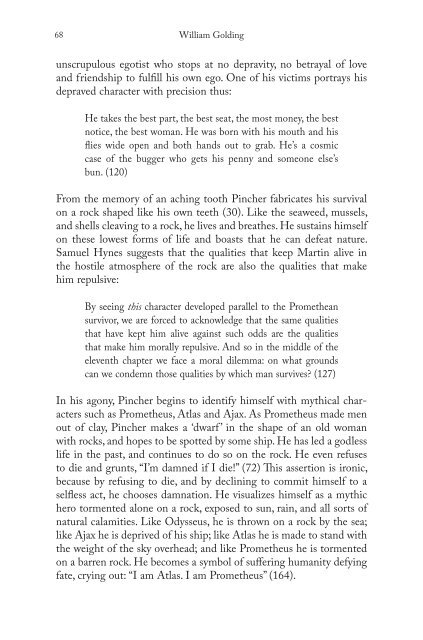Blooms Literary Themes - THE TRICKSTER.pdf - ymerleksi - home
Blooms Literary Themes - THE TRICKSTER.pdf - ymerleksi - home
Blooms Literary Themes - THE TRICKSTER.pdf - ymerleksi - home
Create successful ePaper yourself
Turn your PDF publications into a flip-book with our unique Google optimized e-Paper software.
68<br />
William Golding<br />
unscrupulous egotist who stops at no depravity, no betrayal of love<br />
and friendship to fulfi ll his own ego. One of his victims portrays his<br />
depraved character with precision thus:<br />
He takes the best part, the best seat, the most money, the best<br />
notice, the best woman. He was born with his mouth and his<br />
fl ies wide open and both hands out to grab. He’s a cosmic<br />
case of the bugger who gets his penny and someone else’s<br />
bun. (120)<br />
From the memory of an aching tooth Pincher fabricates his survival<br />
on a rock shaped like his own teeth (30). Like the seaweed, mussels,<br />
and shells cleaving to a rock, he lives and breathes. He sustains himself<br />
on these lowest forms of life and boasts that he can defeat nature.<br />
Samuel Hynes suggests that the qualities that keep Martin alive in<br />
the hostile atmosphere of the rock are also the qualities that make<br />
him repulsive:<br />
By seeing this character developed parallel to the Promethean<br />
survivor, we are forced to acknowledge that the same qualities<br />
that have kept him alive against such odds are the qualities<br />
that make him morally repulsive. And so in the middle of the<br />
eleventh chapter we face a moral dilemma: on what grounds<br />
can we condemn those qualities by which man survives? (127)<br />
In his agony, Pincher begins to identify himself with mythical characters<br />
such as Prometheus, Atlas and Ajax. As Prometheus made men<br />
out of clay, Pincher makes a ‘dwarf ’ in the shape of an old woman<br />
with rocks, and hopes to be spotted by some ship. He has led a godless<br />
life in the past, and continues to do so on the rock. He even refuses<br />
to die and grunts, “I’m damned if I die!” (72) Th is assertion is ironic,<br />
because by refusing to die, and by declining to commit himself to a<br />
selfl ess act, he chooses damnation. He visualizes himself as a mythic<br />
hero tormented alone on a rock, exposed to sun, rain, and all sorts of<br />
natural calamities. Like Odysseus, he is thrown on a rock by the sea;<br />
like Ajax he is deprived of his ship; like Atlas he is made to stand with<br />
the weight of the sky overhead; and like Prometheus he is tormented<br />
on a barren rock. He becomes a symbol of suff ering humanity defying<br />
fate, crying out: “I am Atlas. I am Prometheus” (164).

















